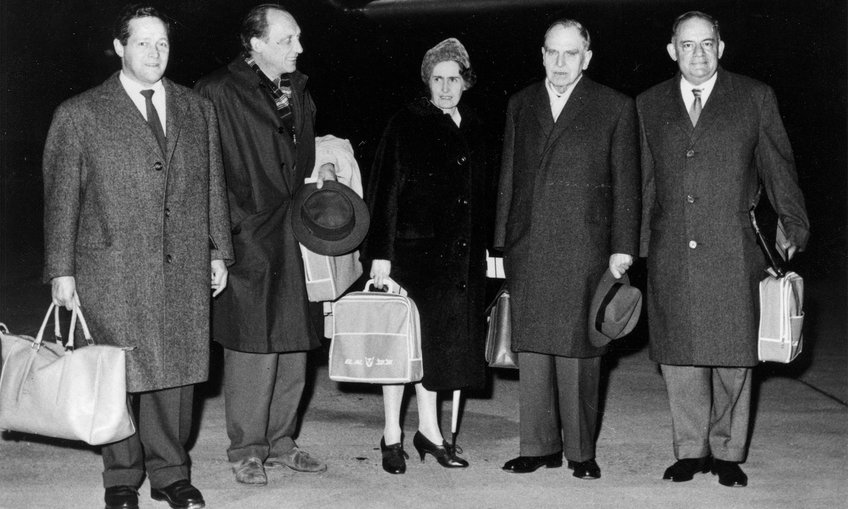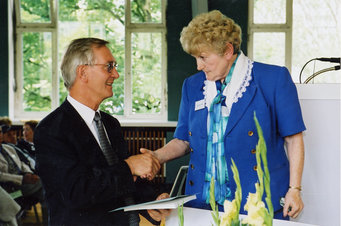The Max Planck Society's scientific relations with Israel are a chapter of contemporary German history
The close ties of the Max Planck Society with Israel date back to the period shortly after the Holocaust when reconciliation between Germans and Israelis appeared unimaginable.

Prof. Feodor Lynen, Prof. Wolfgang Gentner, Alice Gentner, Prof. Otto Hahn and Dr. Josef Cohn (from left to right) on their way to Israel.
© Archiv der Max-Planck-Gesellschaft
Confronting the Holocaust posed one of the most daunting challenges for the German government after the Second World War. This task encompassed efforts to establish diplomatic relations between the Federal Republic and the newly established State of Israel. In the 1950s, Chancellor Konrad Adenauer initiated the process of providing financial compensation to surviving victims. A more crucial objective was fostering reconciliation between Germans and Israelis-a seemingly insurmountable feat after the mass murder of European Jews perpetrated by the Germans. Between 1933 and 1945, an estimated six million people of Jewish origin perished in massacres, concentration camps, and extermination camps. Germany had to fully acknowledge its accountability for these atrocities following the collapse of the Third Reich. Adenauer found a vital ally in the challenging endeavour of establishing closer ties with Israel within the Max Planck Society (MPG). A significant milestone occurred with the visit of Otto Hahn, the President of MPG at that time, who led a small delegation to the Weizmann Institute in 1959. The visit was initiated by Josef Cohn, representative of the Weizmann Institute in Europe.
It marked the inaugural visit of an official German delegation to Israel. Shared scientific concerns and interests, particularly in the field of physics, played a pivotal role in bridging the profound chasm of mistrust and alienation left in the aftermath of the Third Reich. Scientists from the Kaiser Wilhelm Society, which later became the Max Planck Society in 1948, had also exploited the inhumane Nazi system to pursue their research agendas. Consequently, there was strong opposition within the young Weizmann Institute about the impending visit. However, the delegation members, especially Otto Hahn, enjoyed a high professional reputation and were untainted by National Socialism. Hahn had maintained connections with Jewish colleagues expelled during the Nazi era. These relationships proved instrumental in ushering in a new era of understanding. The Weizmann Institute itself had a strategic interest in securing the Max Planck Society as a partner and supporter. This move aligned with the interests of the Israeli government, which viewed a thriving scientific system as a catalyst for innovation in the fledgling state under construction.

Eva Mozes Kor thanked Max Planck President Hubert Markl with the hope "to convey a message of forgiveness to the world, at least on a small scale".
© Norbert Michalke
The bridge-building mission proved successful, leading to the agreement of a scientific exchange programme between the Weizmann Institute and the Max Planck Society, backed by financial support from the German government. The establishment of the Minerva Foundation in 1964 established a stable institutional framework for this collaboration, which has since continued to flourish to the present day. Subsequently, the Fellowship Programme was introduced in 1973, followed by the establishment of the first Minerva Centres at universities in Israel in 1975. This year's anniversary of the 50th anniversary of the Minerva Fellowship Programme is now tragically overshadowed by the devastating events in Israel.
Hahn's 1959 trip had a significance that extended far beyond science; it marked a pivotal moment in the diplomatic reconciliation that followed. Just a year later, German Chancellor Konrad Adenauer and Israeli Prime Minister David Ben-Gurion met in New York, laying the groundwork for official diplomatic relations in 1965.
Over the subsequent decades, Germany underwent a comprehensive historical re-evaluation of the crimes perpetrated under National Socialism. Simultaneously, the Max Planck Society (MPG) confronted its own historical complicity, openly acknowledging its connection to the past. Today, the MPG actively preserves the memory of the Holocaust victims. Its complicity is not only evident in the actions of its predecessor organization, the Kaiser Wilhelm Society (KWG), but also in the fact that individual scientists from the KWG were able to continue their careers at the MPG up until the 1960s - despite their involvement in the National Socialist regime.
It is unacceptable to that Israeli and Jewish citizens are once again facing threats in Germany and that there are celebrations of the terror attacks by Hamas on our streets. We unequivocally condemn all forms of anti-Semitism and hatred in any form.






